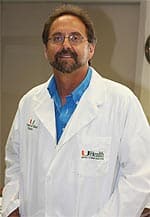Life Extension Magazine®
Sometimes one’s experiences in a chosen career field can alter the trajectory of that career, sending it down a profoundly different path. Something of the sort happened to Dr. Enrique Ginzburg, Professor of Surgery in the Division of Trauma and Surgical Critical Care at the University of Miami’s Miller School of Medicine. Ginzburg says he became deeply interested in the subject of life extension as a direct result of the stresses of his job. “I deal with death and dying every day,” explains Ginzburg. “We see shootings, accidents, and other severe traumatic injuries. In the intensive care wards we sometimes have 30 patients who are in critical care. It’s a high-pressure, high-acuity work environment.” Ginzburg says he became intrigued with age management early in his medical career, when the topic first came to world attention through several groundbreaking books in the 1970s and 80s. “It was the first time the medical field introduced to lay people the possibility that we could increase our life span through caloric restriction, low-fat diets, and supplements like free radical scavengers and antioxidants.” Ginzburg became an early adopter of those ideas. His surgical career progressed meanwhile until finally in his mid-40s, as a direct result of having death and dying as constants in his life, Ginzburg started thinking more seriously about the topic of prolonging life. “I saw an advertisement for an anti-aging conference and attended a lecture given by Daniel Rothenberg, a doctor at the University of California at San Diego, on new uses for human growth hormone.” What impressed him most was that Rothenberg was in academia; Ginzburg was also a professor. Expanding Research Across Boundaries
From that first conference, Ginzburg has increased his involvement in regenerative research. “We’re looking at stem cell research, regrowth of cardiac tissue, and cell regeneration using telomerase augmenters.” Telomerase is an enzyme that allows for the replacement of bits of DNA known as telomeres, which are otherwise lost when a cell divides. Ginzburg believes telomerase therapies may be used not only to combat cancer, but also to get around human aging and significantly extend life span. Moving from trauma surgery to life extension isn’t as big a leap as one might think, especially for Ginzburg, who sees all medicine as branches of the same tree. “The biologic organism is completely interconnected in all aspects of life. What we want to do is help people not just in the acute phase when they require surgery, but also to prevent surgery by optimizing health. And whatever you do crosses over all disciplines of medicine.” In fact, Ginzburg surmises that recent studies of human growth hormone in post-operative wound healing will one day bear fruit in his own surgical ward: “I can see measuring peoples’ IGF-3 level prior to surgery, and if it’s low, augment it for several weeks to boost the body’s ability to heal, continuing with it post-op.” IGF-3 is one of the newer insulin-like growth factors (or IGFs), peptides released from various cells that have the ability to stimulate cell growth and multiplication. Resistance to New IdeasLike many new ideas, life extension techniques like hormone augmentation have not been met with universal acclaim. Ginzburg points to his own experiences. “When I first showed interest in developing this idea, there was a lot of resistance from the university as well as other physicians,” he recalls. “Some were encouraging, but I met with a considerable amount of obstruction.” But that was several years ago. Times have changed—if slowly. “Today, to my delight, researchers and experts in the field agree about hormone augmentation.” Use of human growth hormone still meets with some resistance, but Ginzburg believes the tide of acceptance is turning as more successful research comes out. “This is especially true in patients where there is nothing more to offer,” he adds. He has taken a similar approach to the use of testosterone for intensive care patients on ventilators. “When I’d walk through the ICU, I’d see patients that were emaciated and not thriving. They were chronically ill and they weren’t getting better,” Ginzburg says. “So I talked to the families and told them that supplementing with testosterone was not something used very often, but it might possibly work. We still need to do a large, prospective, randomized trial to prove its effects, but the results have been promising. Supplementing with testosterone gave patients, especially elderly males, some muscle mass to help them breathe better.” Ginzburg also believes there is an enormous reservoir of valuable alternative medical practices and medicinal products, but most of these still require a significant amount of research to establish their effectiveness. Ginzburg says he has seen supplementation totally change lives in cases of deficiency. “Once demonstrated that they do work, these can be inserted into daily health regimens,” he states. “For example, CoQ10 has been shown to work as an antioxidant, killing melanoma cells in lab tests and even fighting periodontal disease.” Coenzyme Q10 is a compound found naturally in cell mitochondria. CoQ10 is involved in the making of the molecule ATP, which serves as the cell’s major energy source and drives a number of biological processes including muscle contraction and the production of protein. “CoQ10 is a perfect example of a product with minimal toxicity that I believe people should be taking as a prophylactic,” Ginzburg says. “And there are a great many others, such as vitamin B6, which has shown promise in reversing atherosclerotic disease.” In addition, there are the studies on telomerase. “The second generation of telomerase-augmenting products has been shown to increase the size of telomeres. Those results are about to be published. There are also other growth hormones like testosterone that have significant benefits. I think safety concerns are being alleviated, although we still do need long- term studies.” Then there are more studies in his home field of surgery. “We are looking at new methods of pain control, and have been working on setting up a randomized trial of low-energy laser treatment for pain management and healing. We know from preliminary work that this does in fact help alleviate chronic pain and inflammation.” Future Health ChallengesOn the other hand, acceptance of new medical approaches may be putting the cart before the horse. Research of necessity goes hand in hand with the creation of a viable health care system for the 21st century: as always, the main question is one of money. “Physicians, academic centers, and hospitals both inner city and private, are severely strained trying to provide adequate care,” says Ginzburg. “Doctors are forced to see a lot of patients in order to meet their monthly means, and hospitals have cut back on personnel. Nursing provides the most care, but nurses are disappearing.” Fast food companies also need to step up to the plate and provide foods that are healthy. “More vegetables and less saturated fats can reduce sickness,” says Ginzburg. “A revolution in the employment sector is sorely needed as well. Employers should set aside 30 minutes every day for physical exercise, possibly even at the work place.” The aging of our population is perhaps the greatest challenge of all, according to Ginzburg, who says the government doesn’t provide money for adequate care in assisted living centers. “There needs to be an increase in funding for preventative medicine like exercise and nutrition, to help fight chronic diseases. There is no escaping the fact that the world’s population is getting older. I believe medical science has an obligation to do what it can to maintain quality of health in these longer lives.” “More vegetables and less saturated fats can reduce sickness,” says Ginzburg. In the realm of longevity, Dr. Enrique Ginzburg definitely practices what he preaches. He maintains a healthy lifestyle incorporating regular exercise, healthy foods, and supplementation. “I try to ride a bicycle for aerobic exercise 15 minutes a day, followed by 20 minutes of weight training,” he says. “It’s important for me to do this at least five days a week. Exercise is a great stress fighter, and it helps me to keep in shape, mentally as well as physically.”
If you have any questions on the scientific content of this article, please call a Life Extension® Wellness Specialist at 1-866-864-3027. |



